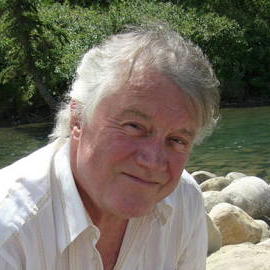- Hector Berlioz
- Prima Classic
- Venezuela
- Bosnia
- Alcides Lanza
- Truro
- Kerensa Briggs
- Last Night of the Proms
The Innocent Fields
Recent items of interest, including the Presteigne Festival, Jonathan McPhee adapting Wagner, Nick Hely-Hutchinson's Perfect Pitch podcast, the Stabat Mater music calendar and a study of unusual vocal techniques
The 2023 Presteigne Festival finishes this evening (28 August), sadly one day earlier than usual due to difficulties obtaining funding. As usual, the festival, in the Welsh border marches area of the UK, is a meeting place for contemporary composers. Those visiting this year include Michael Berkeley, Edward Gregson, Cheryl Frances-Hoad, Thomas Hyde, David Matthews, Ed Nesbit, Roxanna Panufnik (2023 composer-in-residence), Claire Victoria Roberts, Rhian Samuel and Peter Thompson.
The attractions at Presteigne included the first performance of festival founder Adrian Williams' The Innocent Fields, setting words selected by Williams from celebrated Welsh poet Gillian Clarke's set of poems The Hours, providing a unique, moving and powerful picture of life in the Welsh countryside during the COVID19 pandemic.
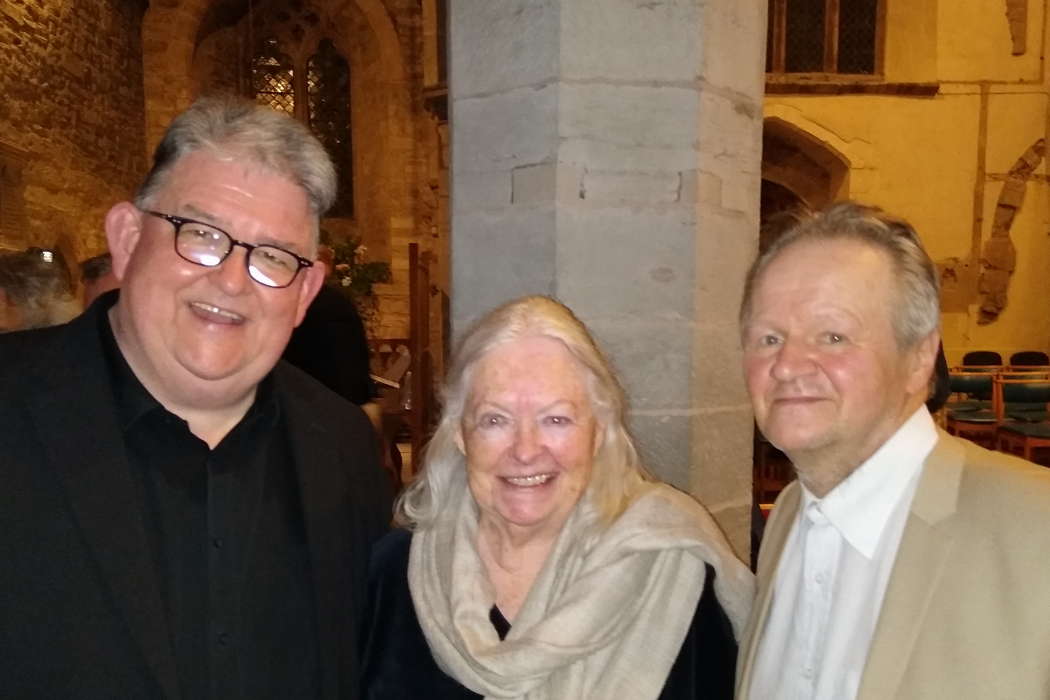
From left to right: George Vass, Gillian Clarke and Adrian Williams in St Andrew's Church, Presteigne, after the performance of The Innocent Fields at the Presteigne Festival. Photo © 2023 Keith Bramich
The Innocent Fields was commissioned jointly by the Presteigne Festival and St Albans Choral Society, who will give a further performance in April 2024. The solo part in Williams' new work was performed by baritone Julien van Mellaerts (whose CD Songs of Travel and Home received high praise here from Geoff Pearce).
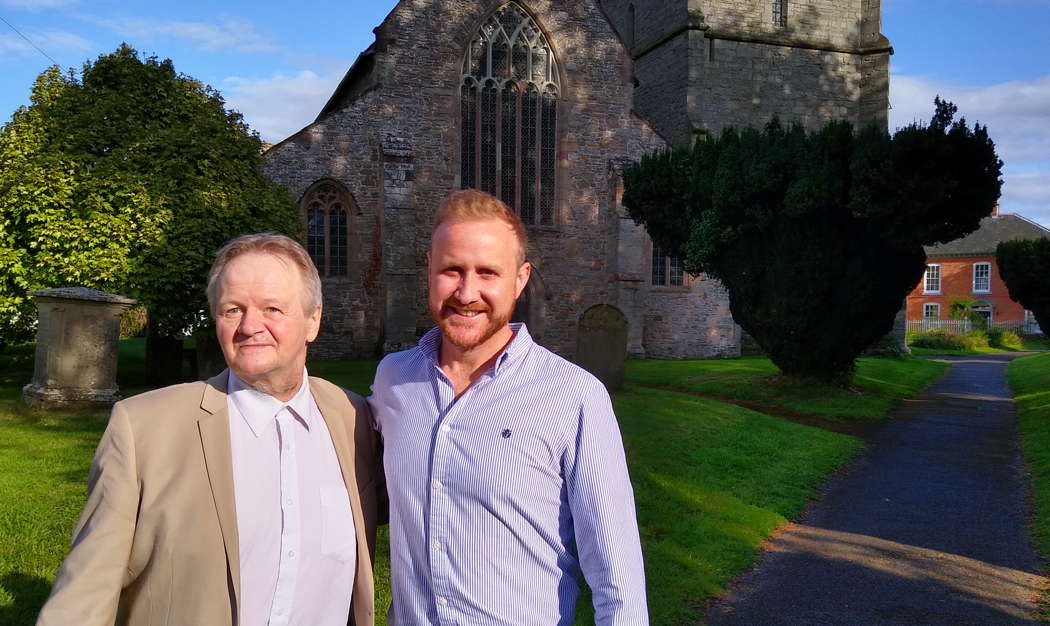
Adrian Williams (left) and Julien van Mellaerts in front of St Andrew's Church, Presteigne, at the Presteigne Festival. Photo © 2023 Keith Bramich
Also performing were the Choir of King's College London (prepared by their director Joseph Fort).
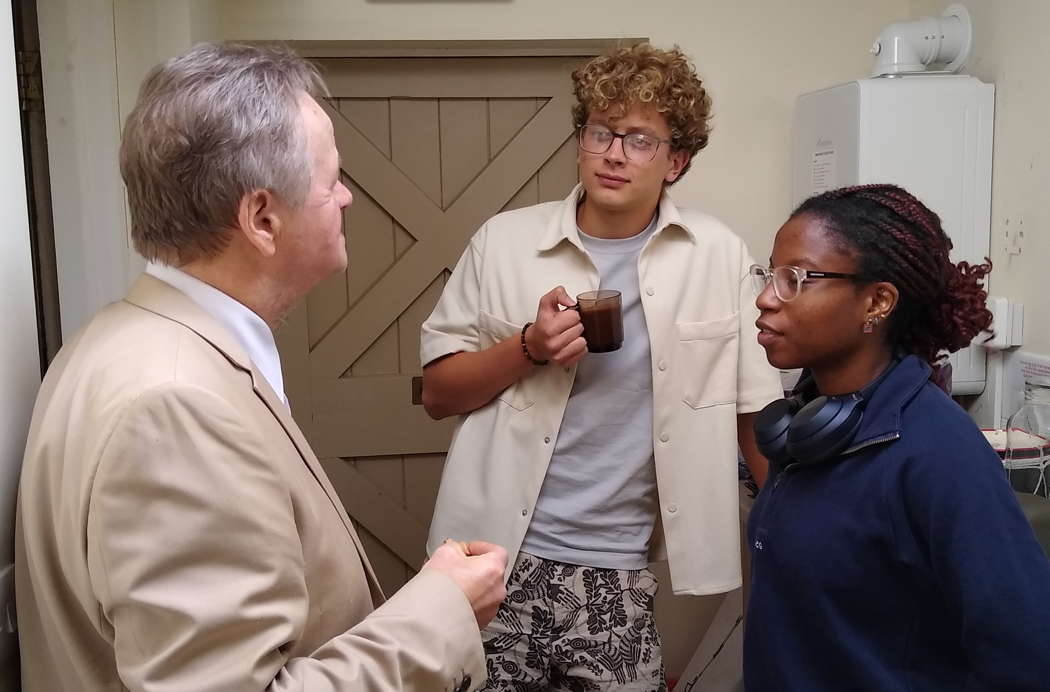
Adrian Williams (left) in conversation with members of the Choir of King's College London after rehearsing 'The Innocent Fields' in Presteigne.
Photo © 2023 Keith Bramich
The festival's musical director George Vass conducted the Presteigne Festival Orchestra.
The Presteigne Festival returns 22-26 August 2024, featuring music by Benjamin Britten, William Mathias and welcoming Richard Blackford as composer in residence during his seventieth year. The 2024 festival will also include first performances of works from at least twelve composers.
Further information: presteignefestival.com

The instrumentation and time commitment of Richard Wagner's multipart Der Ring des Nibelungen limits performances of the work to large-scale opera companies and orchestras. But last month, Massachusetts-based composer, conductor, arranger and music director Jonathan McPhee published the first half of The Essential Ring - a reduced adaptation of Wagner's opus that aims to make the work accessible to more orchestras and their audiences. McPhee worked for several years with the original engravings (printed scores) that include the composer's handwritten manuscript along with, as McPhee says, 'tons of mistakes'.
The re-orchestrations of Das Rheingold and Die Walkure (now available) include reduced versions as well as piano-vocal scores that can bring the work to colleges, regional opera companies, smaller orchestras, individual singers, and Wagner Societies around the world.
McPhee is among a handful of artists who create reduced orchestrations of large, well-known classical music pieces. But his experience on both sides of the podium - with leadership roles at orchestras around the USA, and conducting for professional orchestras of all sizes in major halls around the world - gives him a unique advantage.
'My approach is always to be respectful of the original composers' intentions', McPhee says. 'But a lot of this work involves tricking the ear into hearing sounds produced by instruments other than the ones originally used.' The Essential Ring and other McPhee reductions are available through publisher Boosey & Hawkes.
Further information: jonathanmcphee.com

Nick Hely-Hutchinson, a lifelong fan of classical music, brings a fresh approach, accessible and original insight in his podcast Perfect Pitch: Classical Music Deconstructed. It's for everyone, expert or beginner, old or young. Join people all around the world and lend Nick your ears for half an hour each week to enrich your life!
Further information: perfectpitchpod.com
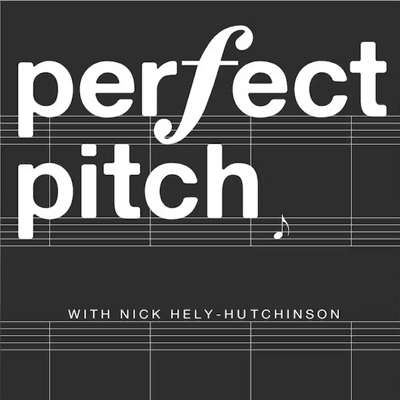

A unique Stabat Mater Music Calendar 2023 is available for composers, musicians and music lovers. Listen to the Stabat Mater, the important and famous Marian sequence in classical and church music, through a QR code every month. Twelve recordings of the famous old prayer recalling the grief of mothers losing their child, in various musical styles, such as early music, baroque, classical, jazz and many more. This calendar is a project of the non commercial Ultimate Stabat Mater Website Foundation, based in the Netherlands. Those interested in classical music will find a collection of hundreds of Stabat Mater compositions and the translation of the Latin text in twenty-five languages.
Further information: stabatmater.info

And finally ... Huddersfield University is in the news again with a two-year project which looks into the challenging world of extreme metal music to discover how vocal techniques from this cult genre work artistically and scientifically, and how they might be of use to contemporary composers.
Eric Smialek, Senior Research Fellow, Department of Music & Design Arts, has been a fan of extreme metal since growing up in his native Canada. Sub-genres like black and death metal come under the extreme metal umbrella, with bands like Death and Possessed producing early examples of the genre as far back as the 1980s.
But it is the terrifying low growls of the vocal techniques used in extreme metal that Smialek is investigating for his project Extreme Metal Vocals: Musical Expression, Technique, and Cultural Meaning:
It was a style of music I was really interested in as a fan and as a musician. I wanted a way into it. As part of my undergraduate work at the University of British Columbia in 2005, I decided to apply some of what I had learned in my Physics of Music class.
Extreme metal and its vocals were something that had not been written about much at that stage. But in that class, we were learning all sorts of things about acoustics, perception and science. As part of my term paper, a friend recorded my voice doing extreme metal vocal techniques as an amateur.
We segmented them into low, middle and high types but, listening back to it, I felt that the main difference between them was in the vowel sounds. That was the main difference between my high, middle and low screams. What was cool was that in physics class, we were learning about visualisations of sound called spectrograms that linguists have used for years to study the acoustics of speech and vowels.
The early extreme metal bands had not grown up listening to extreme metal, so their vocalists have very individual styles. It's interesting and fun to chart all the nuances, like a map, and see how different conventions developed and what features of their sounds set them apart from each other.
Smialek's project will synthesize linguistic, acoustical, historical and musicological studies of vocal techniques used in extreme metal. He is presenting at conferences in Montreal and Minneapolis in 2023, and is co-hosting a workshop in Thessaloniki, Greece with Pierre-Luc Senécal, founder of Dremeka Choir (also known as the Growlers Choir).
A workshop on composing and arranging for extreme metal vocals and choir sounds niche. But learning about the vocals and all the things you can do with them musically can be helpful if you are an avant-garde composer, or a metal musician wanting to do something different. There is overlap between how musicians normally overdub voice recordings in a studio and how you can also layer individual voices with an extreme metal choir.
The project will see Smialek work closely with Huddersfield University's Jan Herbst, a Reader in Music Production, providing collaborative research opportunities as well as valuable professional development with funding and project management.
But he also hopes to devise a technological offshoot from studying extreme metal vocals that will help musicians both inside and outside of the genre.
I'm working with specialists in music technology here to try to come up with an app that I want people to play with to write music, or to communicate between band members or different musicians. Imagine being a drummer and being able to show a vocalist exactly what kind of shifting growl or scream sounds you have in mind.
In the last four or five years, there have been more publications and it feels like people are really starting to talk about this stuff a lot more. There was hardly anything when I began in 2005.
Posted 28 August 2023 by Keith Bramich




